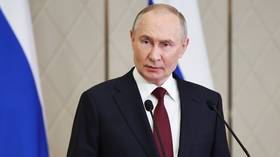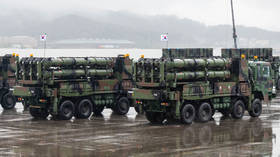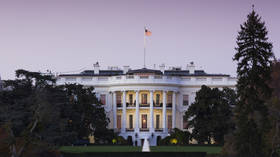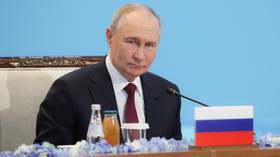Pentagon resists US withdrawal from Syria, claims ISIS might rise again
The newest report on US-led operations against Islamic State in Iraq and Syria admits the terrorist group is down to some 2,000 fighters, but argues continued US presence in the region is needed to prevent its resurgence.
Published on Monday, the report authored by the Pentagon and State Department inspectors-general also blamed Turkey for spoiling the US-backed Kurdish militia’s operations against Islamic State (IS, formerly ISIS/ISIL), and predicts no end to strife in the region, going against President Donald Trump’s order to withdraw US troops from Syria.
Latest Inspector General report on Inherent Resolve offers partial corrective to eye-popping July 2018 estimate of ISIS manpower in Syria: https://t.co/CeIlayf0u3pic.twitter.com/5iH6ZsUeE8
— Sam Heller (@AbuJamajem) February 4, 2019
The report debunked the widely circulated estimate – from June 2018 – that IS had up to 17,000 fighters in Iraq and up to 14,000 in Syria, calling it questionable even at the time. The US-led coalition, known as the Combined Joint Task Force – Operation Inherent Resolve (CJTF-OIR) had “low confidence” in those estimates as of last July, the report said. As of January, CJTF-OIR estimated only 2,000 IS fighters remaining in the group’s last remaining bastion – known at the Pentagon as the Middle Euphrates River Valley (MERV) and located in eastern Syria near the Iraqi border.
The coalition gave conflicting assessments of IS strength and capabilities, reporting at the end of December that it “remains a battle-hardened and well-disciplined force,” with high morale and “unfazed by Coalition airstrikes,” only to say its morale was “trending downward” in January.
Since December, IS has killed several coalition soldiers in ambushes and with roadside bombs. According to CENTCOM, these are “opportunistic attacks” that will allow the militants to claim a propaganda victory.
‘We have to protect Israel’
Even as US troops are pulling out of Syria, President Trump has said he wants to keep some forces in the region “to protect Israel” and “watch Iran.”
“We have to protect other things that we have,” Trump told CBS on Sunday, but said the troops will be “coming back in a matter of time.”
Also on rt.com Trump did not ask permission to ‘watch Iran’ from bases in Iraq – President SalihMonday’s report, on the other hand, matches the reasoning of US intelligence chiefs last week that IS will rise again in the absence of US troops – although only in the limited area near its current holdout, rather than Syria and Iraq as a whole.
“You’ve got these divergent narratives,” security analyst Charles Shoebridge told RT. “Trump is speaking from the hip, if you like, he is speaking off the cuff, and it might be what he’s saying is actually a little bit closer to the truth of where the American strategy actually lies.”
The US ‘deep state’ is firmly against withdrawal from Syria, Shoebridge noted.
Exhibit A in how the bureaucracy is moving to undercut troop withdrawals. ISIS will "claim victory" when US forces leave, therefore they can never leave. It's almost too predictable https://t.co/LIz560OPRC
— Michael Tracey (@mtracey) February 4, 2019
Turkey blamed for failure of US-backed offensive against ISIS
One of the things the report revealed is that the US-backed militia was presumably on the brink of crushing the last IS holdout in the Euphrates Valley, but had to halt their operation when Turkey threatened to intervene against the Kurdish fighters.
The Kurdish YPG militia makes up more than two thirds of the US-backed Syrian Democratic Forces (SDF), which the US have used as the main proxy against IS in northeastern Syria. With the YPG busy against the Turks, the Arab component of the SDF was “unable to conduct” offensive operations, and actually lost ground to IS in late October and November, when bad weather prevented coalition airplanes from flying.
It was only in mid-November, when the YPG was back in the fight, that the SDF was able to roll back IS gains, the report said, describing the YPG “paramount to stability and efforts to defeat ISIS.”
The report was also skeptical of Turkey’s offer to take over the battle against IS, noting that with the exception of the 2016 Al-Bab operation, “Turkey has not participated in ground operations against ISIS in Syria since 2017, nor have Turkish forces participated in the fight against ISIS in the MERV, which is approximately 230 miles away from al Bab and the Turkish border.”
Let Syria finish the job?
IS will remain an issue unless Sunni “socio-economic, political, and sectarian grievances are not adequately addressed by the national and local governments of Iraq and Syria,” the soldiers and diplomats argue. Left unsaid is that these grievances are a product of upheaval caused by the 2003 US invasion of Iraq and the US support for sectarian rebels in Syria starting in 2011.
Also on rt.com No pullout of Iraq, it can be base ‘to do something in Syria’ – Trump on first visit to troopsConspicuously absent from the report is the Syrian government, which has fought IS successfully with the support of Hezbollah, Iran and Russia, Shoebridge told RT.
If the SDF strikes a deal with Damascus following the US withdrawal, Shoebridge said, “the Syrian government could fill that vacuum, and continue with their very successful campaign against ISIS themselves.”
Think your friends would be interested? Share this story!













